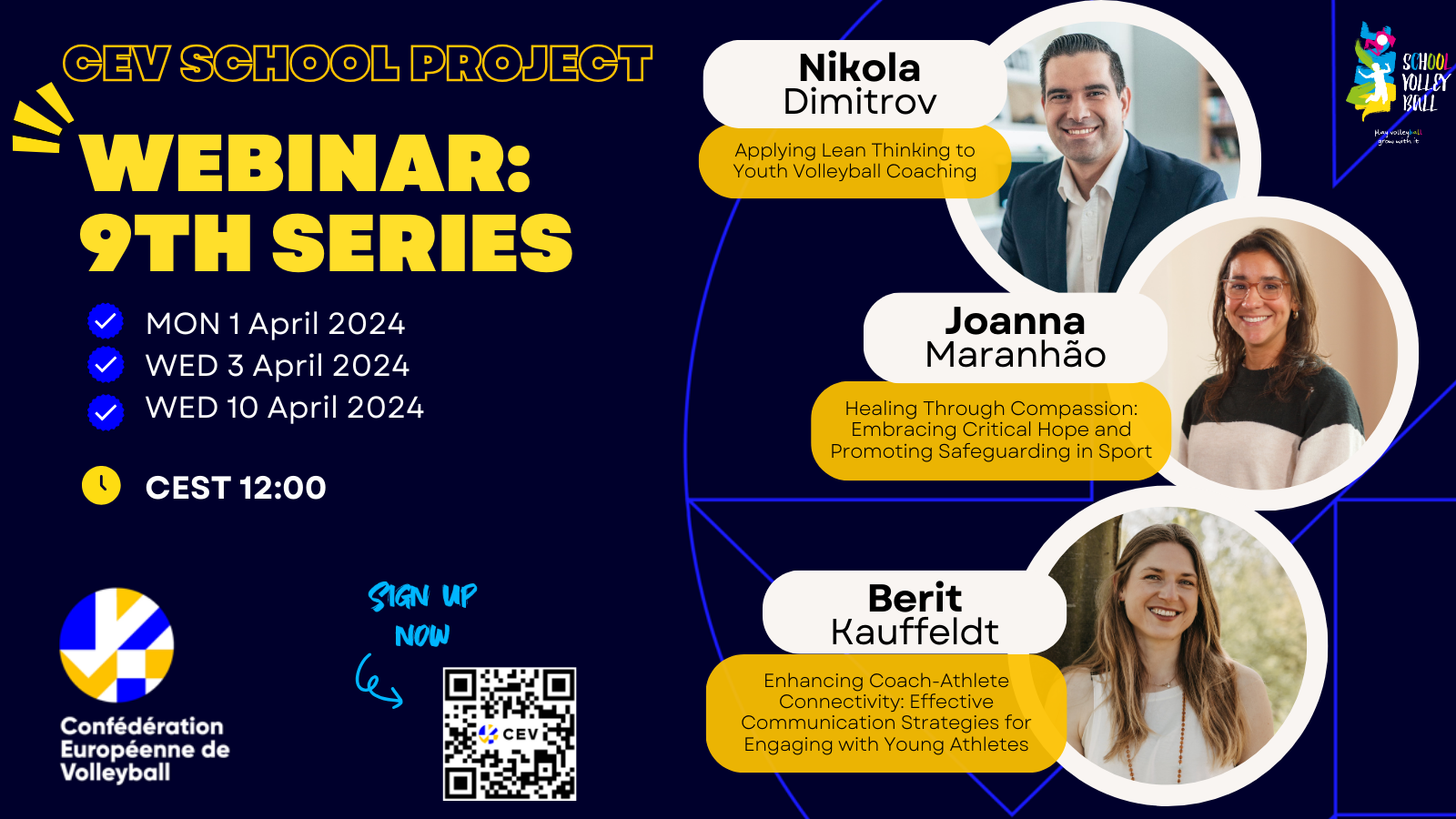Hundreds of coaches and teachers join latest CEV School Project webinars
News
The ninth webinar series organised by the CEV Technical and Development Department in conjunction with the CEV School Project ‘Play Volleyball – Grow with it’ has been a resounding success with as many as 431 people from across the globe – thereby accounting for 134 countries – registering for participation. Those who could not make it and attend the online sessions can still (re)watch the webinars here https://inside.cev.eu/development/videos/ to grow and further enhance their skills.

Session 1: Applying Lean Thinking to Youth Volleyball Coaching
The series had started this past April 1 with a session hosted by Bulgaria’s Nikola Dimitrov, who introduced the attendees to the concept of Lean Thinking, its five core principles, the main factors that hinder the process of lean thinking and to a variety of practical applications as well. Dimitrov reviewed the seven virtues of Bushido – Integrity, Honour, Courage, Compassion, Respect, Honesty, and Loyalty – a moral code that developed in Japan during the Middle Age and whose essence remains relevant even in contemporary times. Many teams in the Far East still adhere to these values, and Dimitrov believes that the right adaptations can pave the way towards the development of intriguing innovations for the next generation. When it comes to respect, Dimitrov said: “One common mistake is that we assume that our hierarchy means that the kids should respect us, but actually it’s the opposite way: it is us who have to respect the kids and earn their respect,” he said while addressing coaches and teachers working at the entry level of the game. In his lecture, Dimitrov discussed the five core principles of lean thinking, which include: (1) identifying value, (2) delivering the value, (3) creating continuous flow, (4) responding to the needs, and (5) striving for perfection.
Nikola Dimitrov“Change means that you have to have self-discipline and sometimes you have to go through a little bit of hardship too. Moreover, change never happens when you do not sacrifice your old habits. Before you start your work, you need to create some kind of standard for the continuous improvement. If there is no standard, there can be no improvement because you do not know what you are improving on.”
Session 2: Healing Through Compassion: Embracing Critical Hope and Promoting Safeguarding in Sport
Only a couple of days later, former competitive swimmer and multiple Olympian Joanna Maranhão of Brazil delivered the second webinar with a focus on safeguarding in sport. She introduced the attendees to trauma-informed principles, making sure they would understand the concept of safeguarding, exploring power imbalances and discussing the concept of violence, thereby including specific types of behaviours falling under this category. The former swimmer invited the audience to realise and understand that anyone can be affected by trauma. Therefore, it is highly important to recognise the signs of people who have suffered from it before responding by applying the necessary knowledge. To avoid any recurrence, it is vital that coaches work with compassion. This means showing empathy (since the coaches know how the children face challenge and what it feels to learn and succeed in sports), compassion (listening actively and trying to accommodate their needs), and care, thereby prioritising the children’s well-being.
Joanna Maranhão“Practice active listening when engaging with athletes. When addressing an athlete after encountering a subtle behaviour challenge or observing a performance below expectations, refrain from asking ‘what is wrong with you?’ Instead, consider asking ‘what happened to you?’ Refrain from interrupting and approach the conversation with care, empathy, and kindness, aiming to meet them where they are."
“The only way to understand your athletes is through an open conversation. Ask for consent to find the right balance. Sometimes, most likely, there are support systems available outside of sports. Therefore, for the coaches who do not have any specific system in place, I encourage looking into civil society organisations, or NGOs, etc.” she added.
Session 3: Enhancing Coach-Athlete Connectivity: Effective Communication Strategies for Engaging with Young Athletes
Finally, Berit Kauffeldt, a former member of the German national team turned psychologist, discussed a coach-athlete centred approach, with a focus on the four Cs of effective coaching, namely (1) Commitment, (2) Closeness, (3) Complementarity, and (4) Co-orientation.
Berit Kauffeldt“The application of these four 4Cs will lead to an increase in both performance and health. Neither the coach nor the athlete can do it all alone. It is important that we choose a coach-athlete centred approach and look into the relationship they have to disclose any hidden potential."
“I invite coaches to try to listen to the emotions when you talk with the athletes. Listen and learn from your athletes. Offer specific, individual, immediate feedback and appreciation. It is much rewarding when you give individual feedback, especially in the context of Volleyball,” she added. In her session, Kauffeldt also introduced ways to develop effective communication via a series of exercises, thereby actively interacting with the participants.